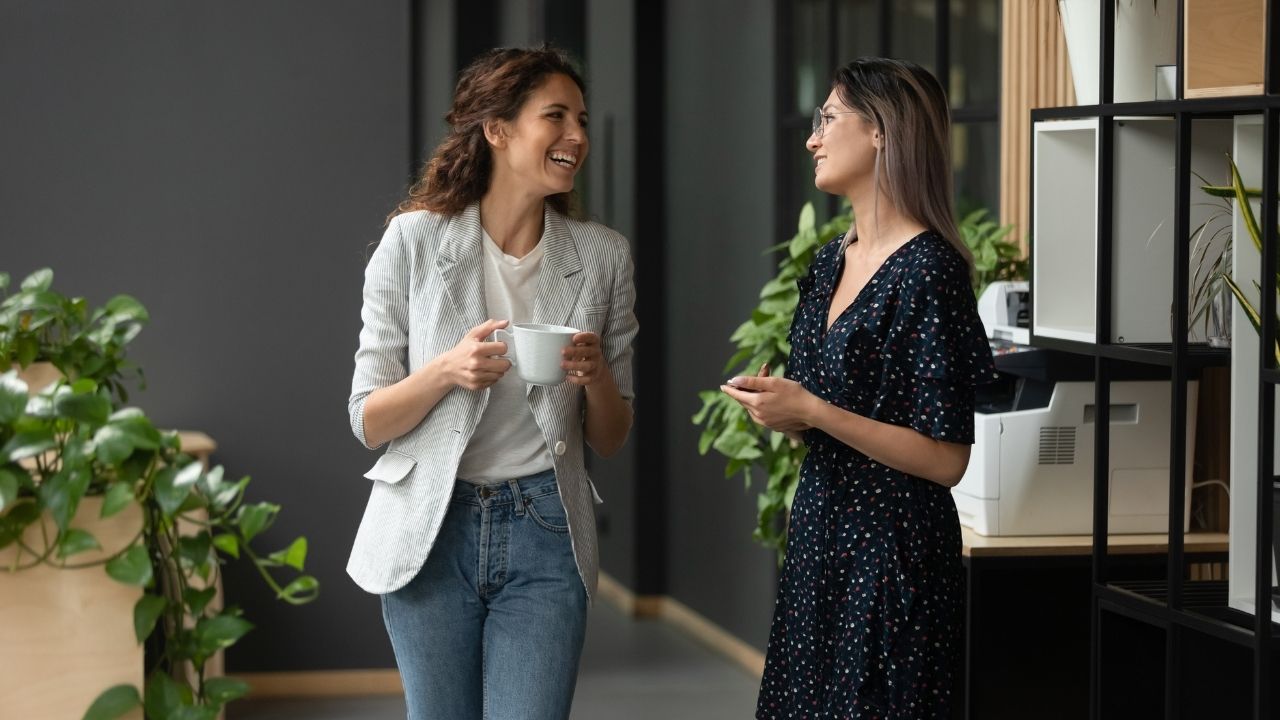- There’s been a trend altering the coworking landscape in recent years, and that’s women-centric coworking spaces.
- In 2020, female-centric coworking space The Wing faced major criticism over its lack of inclusivity for all women and nonbinary people.
- Allwork.Space spoke to two female-focused coworking operators to get their insight on the current female-focused coworking industry, and who they allow to join their spaces.
The total number of coworking members worldwide is set to reach over five million people by this year – compared to just 1.74 million in 2017.
There’s been a trend altering the coworking landscape in recent years, and that’s women-centric coworking spaces.
Despite some controversies along the way, coworking spaces that either cater exclusively to women, or are female-centric, have garnered a lot of attention and members.
In 2020, female-centric coworking space The Wing faced major criticism over its lack of inclusivity for all women and nonbinary people. This included accusations of racist and discriminatory behavior within the workplace.
Months after, CEO Audrey Gelman stepped down, and the firm has been trying to remedy its image ever since.
Allwork.Space spoke to two female-focused coworking operators to get their insight on the current female-focused coworking industry.
In a Q&A with Felena Hanson, founder of the Hera Hub, she elaborated on what exactly a “female-focused” coworking space is, as well as how leaders of coworking spaces can ensure equality and inclusivity.
Allwork.Space: Why are female-centric coworking spaces needed? Within the Hera Hub, what amenities are offered specifically for women?
Felena Hanson: We call ourselves female-focused but gender inclusive. We do have male members and we’ve always been that way. We were the first to expand nationally and internationally and we’re going on 11 years in business in April.
We call ourselves a spa-inspired coworking space. Our programming isn’t necessarily different, although we really pride ourselves on being a safe supportive space.
You can see that in the types of programs that we run, the types of events that we do, we are doing – and you can see this on any of our calendars – 15 to 20 hours a week of virtual programming for our members.
So there is a significant amount of support available for our members. It’s really about a safe supportive space for our members to be vulnerable and ask questions and ask for support.
We don’t take the uber female perspective, it’s more so in everything that we do.
We don’t have any amenities that are specifically offered to women, although the space itself our members describe is very warm and welcoming. It feels like home…it smells good…aromatherapy candles going…nice lighting, and creates that space where women feel comfortable.
Allwork.Space: A few women-only coworking spaces have come under fire for being non-inclusive. How do you define who is able to join the Hera Hub?
Felena Hanson: Absolutely, we are not non-inclusive; we do have male members. Anyone is welcome to join the community if they’re here for the right reasons, and we define that as someone who is not pushy.
Anybody is the right fit if they’re here to be in a supportive community and if they are here to sell. A lot of times, the case of network marketing or network, that’s where we kind of draw the line and say they’re not a fit for us. Anything that’s pushy is really not a good fit for the community.
Allwork.Space: Some say that exclusive coworking entities do not do well, economically or socially. What’s your take on this?
Felena Hanson: We are female-focused, and we’ve been in business for one of the longest coworking space networks in the country. I would argue that we’ve done fine.
We really do pride ourselves on not only diversity and ethnicity, but also age and industry. I would argue we’re actually probably more inclusive than many other spaces.
Allwork.Space: How can leaders of coworking spaces, both female-focused or not, ensure equality and inclusivity?
Felena Hanson: We spend a lot of time onboarding our members, making sure that they feel welcome in the community, and we do a lot to support people in all kinds of industries.
If you’re just targeted towards technology, folks, then you’re going to pull from young white males for the most part.
Every brand has an image, a focus, a niche. If you’re trying to be all things to all people, that’s not a brand.
We keep an eye on diversity – even in industry. If I don’t have many female web developers, I may go out and try to get more female web developers in our community.
It’s something you just always have an eye on. An important piece for us as well is making sure we do have diversity in our community not only from where we are as members, but also leaders.
In a Q&A with CoWomen manager Johannah Illgner, she explained why female-focused spaces are important, and who exactly is able to join CoWomen.
Allwork.Space: Why are female-centric coworking spaces needed?
Johannah Illgner: We provide a safer space for women. This is much needed because in a lot of industries and especially in leading positions the number of women is very low. Therefore women need a place to connect to each other, to network, to exchange their experiences, to learn new stuff, to grow together and support each other.
Allwork.Space: In America, some women-only coworking spaces have come under fire for being non-inclusive. How do you define who is able to join CoWomen?
Johannah Illgner: In our space we welcome women of every background – of course trans women are included as well. If a non-binary, queer or agender person would contact us and if they support our feminist ideas, they are more than welcome.
Allwork.Space: What does CoWomen provide that is geared towards the needs of women? What could other coworking spaces improve upon?
Johannah Illgner: We provide a nice, calm space where women can work side by side and also can work on projects together. We have different formats of networking events; a breakfast for moms with small kids, a business lunch for those who have only one hour time during their lunch break, and of course, more social events in the evenings or weekends.
Only because someone is female, this does not mean that all women have the same needs, and we keep that in mind.
This is something other spaces could improve: To see women not as a homogenous group, there are a lot of differences.
Allwork.Space: How can leaders of coworking spaces, both female-centric or not, ensure equality and inclusivity?
Johannah Illgner: If a space wants to provide an environment which is welcoming towards certain groups of people, it always makes sense to write this down in a statement or code of conduct, et cetera.
It is also very important to communicate that everyone is welcome – of course it shouldn’t be an empty phrase.
So if you welcome people who are religious, have a prayer room. If you welcome people with kids, have a playroom and a changing table. If you welcome people with disabilities, make sure they have access to your facility. I think you get where I am going with this: Don’t only use words, show how you implement inclusiveness and equality.
Allwork.Space: What does the future of work look like for women, and how are their needs evolving? Will women increasingly decide to work from home, the workplace, or coworking spaces?
Johannah Illgner: Women with younger kids have a lot of stress managing care work. So for them, working from home might be very helpful. But also sometimes they have so much going on at home, it is hard to really work in peace from home and they [would] rather go to the office or a coworking space.
But what is clearly showing in our space is that women who are not self-employed and work from home – no matter if they have kids or not, don’t want to work all alone from home all the time and are therefore booking a table at our coworking space. Connecting with others, even if they are not your colleagues, is very important.



 Dr. Gleb Tsipursky – The Office Whisperer
Dr. Gleb Tsipursky – The Office Whisperer Nirit Cohen – WorkFutures
Nirit Cohen – WorkFutures Angela Howard – Culture Expert
Angela Howard – Culture Expert Drew Jones – Design & Innovation
Drew Jones – Design & Innovation Jonathan Price – CRE & Flex Expert
Jonathan Price – CRE & Flex Expert













